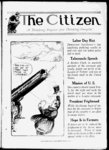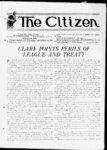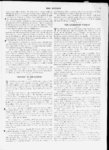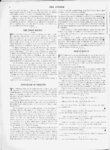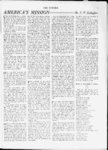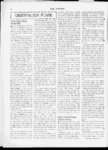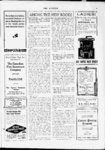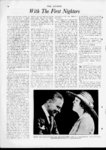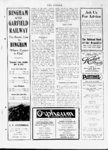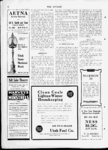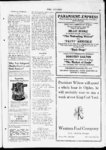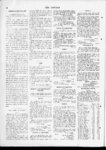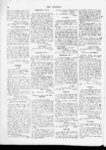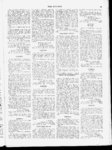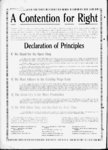| OCR Text |
Show THE CITIZEN t,IIIIIIIIIIIIIIIIHIIHIIIIIIIMIIIIIIIIIMIIIIIMIIIIIMIIIIIIIIIIIimillllllllllllllllllllHIIHIIIIIIIIIIIIIIIIIHIIIIIIIIIIIHIIIIIIIIIIIIIIHIIIIIHIIIIIIIIIllll,,,IIIIHH,IIIIHH,l,,,ll,ll,,,llllll,lll,,,i I i OBSERVATION PLANE ?, III! Illllllllllllllllllllll Police Dodge Duty; Permit Riot nY way of warning we took occa-sioseveral months ago, to declare that a Democratic legislature, when it legalized picketing, paved the way for private warfare, anarchy and rioting. The legislation was of a piece with radicalism and the igthe deep-dyenorant idealism of the recent legislatures. It is almost inconceivable that lawmakers with even a modicum of the saving grace of wisdom could not have seen the peril of throwing the aegis of the law about violence. At a time when the relations of labor and capital were becoming more strained, largely because of conditions which neither was able to control offhand, our visionary solons tossed a firebrand into the powder can. The Labor day riot in front of Sparey & Mehses restaurant was the n, d disbanded union men who should have known better swarmed about the pickets and began to shout. denunciations at the restaurant keepers. They blocked the way of patrons and tried to prevent them from entering. Those who had the courage to push their way through the crowd were jostled, called scabs and roundly cursed. Colonel Cooke, U. S. A. retired, 63 years of age, was one of those who insisted on his right to enter the res- taurant. He was subjected to curses and denunciatory cries as he pushed his way into the restaurant. Although five or six policemen had been sta- tioned there presumably to preserve the peace, they allowed him to be insulted. When he had ordered his breakfast he returned to the doorway and asked the police why they did not do their duty. He was told to go in and eat your breakfast. When he emerged from the restaurant the police allowed the mob to seize Colonel Cooke and hustle him away. The rioters picked him up and one of the mob jerked off his shoes. Attorney Roland R. Woolley and J. W. Morris were threatened when they entered the restaurant and were followed when they came out. As they proceeded across the street to the Walker Bank building, where they have offices, they were called infamous names and threatened with vio- logical sequel of legislative stupidity. No better commentary on the law could have been supplied. Lawlessness was the natural product of a law fomenting anarchy. The private warfare between the waiters and the restaurant proprietors grew tense when Sparey & Mehse decided to contest the legality of picketing in the courts. For months their restaurant had been picketed. Patrons had been noisily assailed with intimidating cries by men and women stationed in front of the restaurant. The proprietors printed a sign giving their side of the case and posted it in one of the front windows.. This increased the bitterness of the legalized pickets who found it difficult to dissuade the passersby from reading the sign from beginning to end. Naturally the pickets were handicapped, for no one stopped to listen to their harangues. One day a woman employe was insulted by a picket and she displayed true pluck by slapping him in the face. Relying on the statute book the picket obtained the arrest of his supposed assailant. It transpired that the wrong woman was arrested, but the trial served a good purpose, for the judge decided that a picket had no right to resort to disorderly con- atsecond tack, but was swept off his feet. Had the police abided by their oaths and by their bonds to protect the public the second assault would not have been possible. Had they cleared the walks and warned the mob that prob- duct. ably would have been The bitterness engendered by these phases of warfare climaxed in a riot prevent further rioting. But back of the dereliction of the in front of the restaurant police is the folly of the legislature. Day. on Labor When the Labor Day parade lence. The veteran of Indian wars and of the Philippines campaign was not merely standing up for his own rights when he asked the police to do their duty; he was fighting the battle of all decent people in the community. That the police virtually sided with the rioters and thereby gave them encouragement was responsible for the assault on the colonel as soon as he emerged from the restaurant. Captain Taggart, who was in charge of the squad of police, tries to excul- pate that colonel himself he on sought the from the ground to protect the sufficient to The police arc able to shift some of the blame to those who, in effect, tried to legalize mob rule. While the law assumes to restrict the manner of picketing it is nothing more than an The riot incitement to violence. g proved this, for just as soon as citizens resented the manner of picketing they were set upon by a mob, insulted and violently dealt with. The police showed their weakness, when, after the attack on Colonel Cooke, they arrested only one of the crowd find he a mere boy. The lad was led away weeping while the terrorists continued their disorderly conduct. At the station the prisoner was asked a few questions and released. No attempt was made to arrest the gang ringleaders. We foresaw that the strike picketing would lead to open violence and gave warning when other sources of publicity either defended the Bolshevism or maintained discreet and politic silence. law-abidin- Neither the city commission nor the police authorities can take refuge behind the picketing law. There is no such thing as a law which permits the violation of law. There is no law wiping out or curtailing the criminal code. No picketing law can license mob violence. The riot was brought to an end by Chief of Police J. Parley White, who went to Labor headquarters and obtained the cooperation of some of the leading union officials. For his appeal to Labor headquarters he has been criticized, but we consider that Forcible he acted with wisdom. methods are seldom advisable when conciliation and common sense will accomplish the same result. The time for force had passed. The police had neglected to use stern measures when they were necessary. The chief, had he detailed another contingent of bluecoats to the scene with instructions to use force, probably would have caused the injury of many. That he succeeded in dispersing the crowd with the aid of the labor leaders and a few words of advise is to his credit. Labor Crowds Towns; Neglects Farms 'T' HE inspiring Labor day parade, A which revealed to us something of the earnestness, energy and power of organized labor, could not but suggest a few serious, if random considerations. Organized industry is thinking much these days of taking control of industry. It wants the government that Is to say, the people to buy the railroads and give it control under the Plumb plan. It talks, of the national ownership and democratic management of the means of transportation, mines, finance and all other monopo$L lies and natural resources. Why national ownership of farms is not included we do not know, for certainly they are our greatest natural resource. In the Labor day parade there was not a single organization producing any of the raw materials on which the human race subsists. Every worker in the parade uses these raw materials in producing something else, but he produces nothing froi$ the soil. The point we wish to make is this the ranks of labor are constantly being swelled by recruits from the farms. Great classes of laborers are engaged in making things that the people do not need things that are not necessaries of life. Men leave the farms to engage in unproductive occupations, but the farms must continue to turn out more than ever if mankind is to be fed and clothed. How can this be done when the population of the cities continues to increase out of proportion to rural population. In a decade our countrys city population increased more than the country population Those to be fed multiplied three times as fast as the farmers who must feed them. A few days ago we were alarmed lest a railway strike might spread over all the land and prevent the distribution of food and clothing. Suppose that the farmers should go on a strike. Suppose the farms and ranches should close down. How long would it take to reduce the whole population to starvation? And yet the farmers have been on a strike for many years. They have been leaving the firms in droves and concentrating in the towns. It is not a general strike, but it is so gigantic that the whole human race is feeling the stress. The war intensified the ' one-thir- one-nint- stress by killing off d; h. a large part of the farm population of Europe. We fared better, but the statistics show that the town population is out of all just proportion to the rural population. ""Nine out of ten would say that the able-bodie- d only possible solution is to get labor back on the farms. The laborer probably would utter this formula in the form of a boast. f.' Nevertheless the problem, in large measure, has been solved by means of an clement which the workers (Continued 6h Page 16.) |
